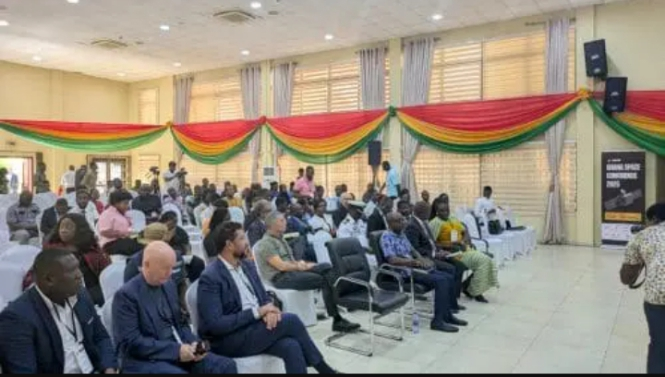By Benjamin Nii Nai,Kwame Bediako
Copyright gbcghanaonline

By Benjamin Nii Nai Anyetei
Ghana is positioning itself as a regional hub for space innovation as stakeholders from government, academia, and industry gathered in Accra for the maiden Ghana Space Conference 2025, aimed at strengthening national capacity in space science, technology, and policy integration.
The conference focused on using space applications for sustainable development, including agriculture, climate monitoring, and natural resource management. Experts emphasized the need for greater collaboration between public institutions, private investors, and international partners to accelerate Ghana’s role in the growing African space economy.
According to the African Space Industry Annual Report (2023) by Space in Africa, the African space economy was valued at US $19.49 billion in 2021 and is projected to reach US $22.64 billion by 2026. The report further reveals that 15 African nations have launched over 58 satellites, with 105 more planned by 2026 , a sign of growing continental interest in satellite communications, Earth observation, and space policy development.
Globally, the Space Foundation’s 2025 Q2 Report indicates that the global space economy reached US $613 billion in 2024, marking a 7% increase from 2023’s US $570 billion, with the commercial sector accounting for 78% of total activity.
At the conference, Professor Nana Ama Browne Klutse, Chief Executive Officer of the Environmental Protection Agency (EPA), underscored the economic and environmental importance of coordinated space operations. She noted that optimizing the use of satellite data could save Ghana millions of cedis annually in duplicated environmental monitoring costs.
“We need stronger partnerships between national agencies to apply earth observation technologies in tackling deforestation, illegal mining, and coastal erosion—three of Ghana’s most pressing environmental challenges,” Prof. Klutse stated.
Mr. Kwaku Sumah, Managing Director of Spacehubs Africa, described space technology as “critical infrastructure for sustainable development.” He highlighted the inauguration of the African Space Agency in Cairo as a major milestone in Africa’s scientific advancement and urged Ghana to leverage its educational and research strengths to lead on the continent’s next technological frontier.
“Space is no longer a distant dream—it’s a development tool.We must integrate satellite applications into national planning to unlock opportunities in communication, navigation, and environmental management”; Mr. Sumah said.
Youth engagement was also a major theme. Albert Forson, National Education and Outreach Coordinator for the International Astronomical Union (IAU), revealed that upcoming initiatives will empower students from basic to tertiary levels to participate actively in Ghana’s space agenda.
These initiatives include hands-on STEM programs such as building 3D-printed helicon antennas to download and analyze real satellite weather data — a practical way to inspire innovation and critical thinking among young learners.
Forson emphasized that Ghana’s long-term success in the space sector will depend on continuous investment in education, research, and technical skills training.
As panel discussions concluded, participants agreed that Ghana’s pathway to a space-driven economy requires policy support, institutional coordination, and youth capacity building. With a strong national framework and sustained collaboration, Ghana could soon move from being a consumer of satellite data to a producer of space-based solutions driving Africa’s economic and environmental resilience.
Ghana’s path to the stars begins in its classrooms, universities, and research centers. With visionary leadership, policy coordination, and youth-driven innovation, the nation could soon play a defining role in Africa’s expanding space frontier.
More Stories Here